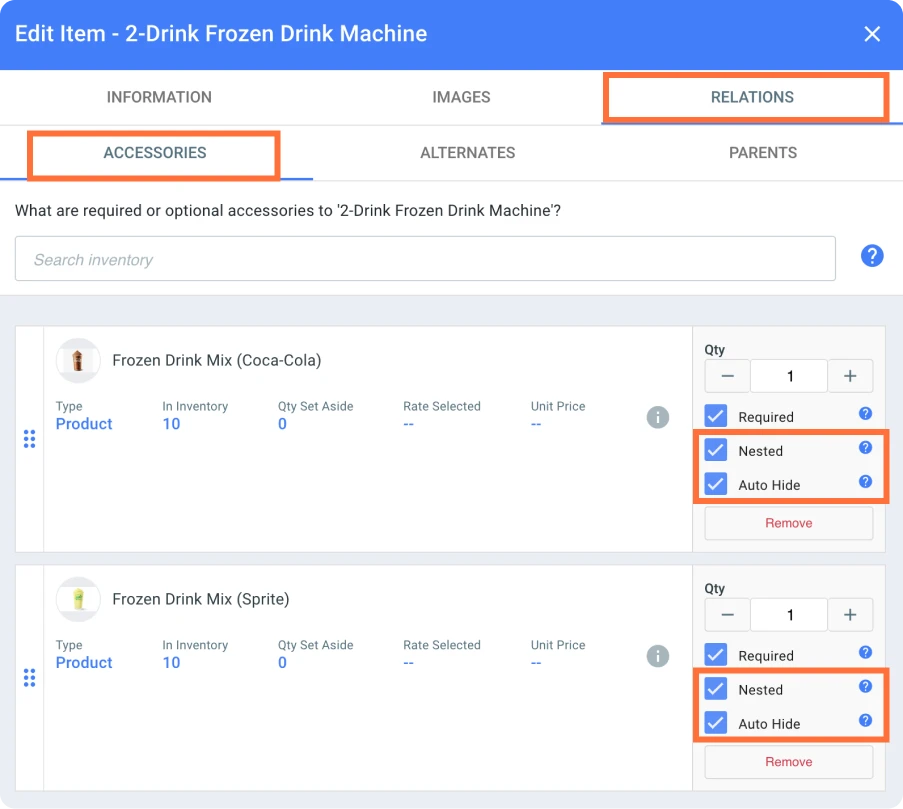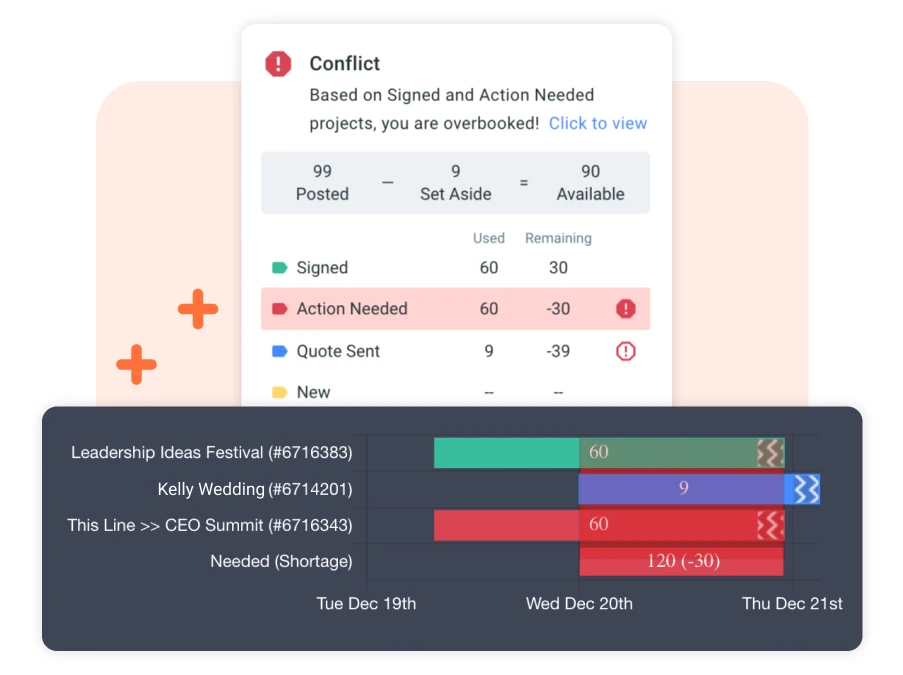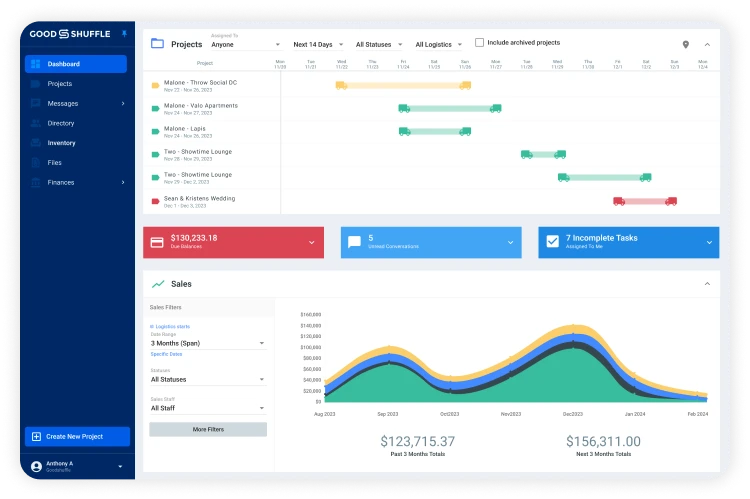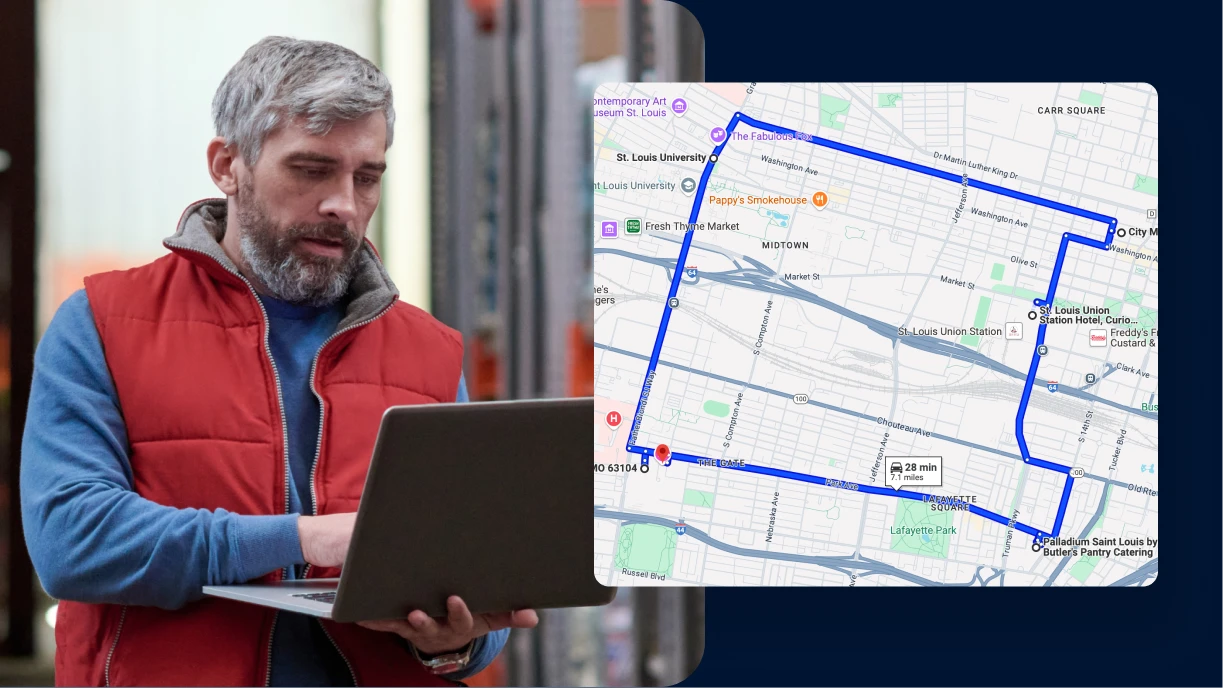You probably didn’t get into the event rentals business because of your passion for negotiating event contracts. Maybe you’re focused on putting on the fanciest baby shower of the year or the biggest conference in your city.
But in order to focus on your top priorities, you need to get through the necessary paperwork. When you successfully negotiate event contracts, you’re able to spend more time and energy on the projects that spark your joy — and less time haggling over line items.
Here’s our guide to smoother, more productive event contract negotiations.
Setting the stage for event rental contract negotiations
Before you can negotiate, you need to know a few things:
- The type of event contract(s) you need: How you negotiate depends on the kind of contract at hand. Entertainment contracts need information on technical requirements, sound and lighting setup, and performance duration, while direct client terms and conditions should focus on things like deposits, force majeure, and property damage policies.
- Your clients’ expectations and budget: From the very first discovery call with your clients, you should have a ballpark range of how much they’re willing to invest in the event and what expectations and priorities they have.
- Essential clauses to include: As you’re building your contracts out, make sure to include essential clauses. The list below is far from exhaustive, and it’s wise to consult a lawyer before sending anything out to potential clients. But it’s a solid starting point as you build out event contracts that protect your business:
- Event description
- Event rental responsibilities
- Payment
- Cancellation
- Term
- Property damage and equipment loss
- Termination
- Limitation of liability
- Indemnification
- Arbitration
- Force majeure
- Governing law and jurisdiction
- Miscellaneous
Event contract negotiations: The 10 dos and don’ts
Now that you have a research-backed contract for your event rental offerings, you’re ready to negotiate. Here are 5 dos and 5 don’ts to help:
#1: Do align on price early using line-item quotes
Your clients will want to know exactly where their money is going, especially if they’re price sensitive. Detailing line items is a good way to show them exactly what they’re getting for their spend. And it shows them that if they want to save on their beach wedding, they may have to compromise on their dream tiki bar.
It also helps to list your inventory on your website via a website integration, so you don’t have to go through your rental items one by one with each client. A ready-to-go catalog of your rental inventory is a surefire way to make sure your clients get what they need while staying within their budget.
When you’re clear and transparent about your quotes from the start, it’ll head off negotiations down the line — saving everyone time.
Tip: Be careful not to list all items in your quotes. Things like electrical wires and ice bags should remain hidden in most circumstances, so you can avoid wasting time over the little things.

#2: Don’t ruin relationships over business
When you prioritize relationship-building over winning, it’ll be easier to understand the other party’s perspective and work toward a mutually beneficial solution. Even if you’re slightly out of your prospective client’s price range, leave some room for small, one-time discounts — especially if they have the potential to become a recurring client.
And if you do decide you’re not a good fit for each other this time around, you’ll have a good rapport for the future if situations change. Who knows, you may even be able to send each other referrals in the meantime.
#3: Do get multiple quotes when you start sub-renting
If you’re looking for new vendors to sub-rent from, never accept the first quote at face value.
Shop around to find the best balance of value, offerings, and price. Even if you do decide to go with the first vendor you investigate, you’ll have a better idea of the market rates for each job or item, which you can use to back up your negotiations. And if your client insists on a lower price point, you have other options to pull from — just beware of the cheapest options.
You can also use this opportunity to hunt around for potential long-term agreements if you enjoy working with a particular vendor or want to become a venue’s preferred vendor.
Just be sure to treat your long-term relationships with loyalty, and only shop around when vetting vendors initially.
#4: Don’t be afraid to walk away
Part of negotiating is doing what’s best for you and your event rental business. If you said yes to every potential client and vendor, you’d find yourself overwhelmed. To continue putting on successful events for your top-priority clients, you have to be a little picky at times.
If a client has issues with your damage payment or late fees policies, for instance, working with them isn’t a sensible decision for your business. In this case, compromising could negatively impact the event and your company’s reputation.
If you come to the table ready to close a deal at all costs, you’re not giving yourself the room to make rational decisions in your event company’s best interest.
#5: Do plan ahead for cancellations
Sometimes unavoidable circumstances arise. Your client pulls out midway through the process or you can’t pull off the event due to extreme weather.
If your client does pull the plug, you’ll want to make sure you’re appropriately compensated for the work you’ve put in so far and the inventory you’ve set aside. Usually, event rental businesses state terms for early cancellations, mid-term cancellations, and last-minute cancellations. The timeframes and refund amounts at each stage are up for negotiation.
But keep in mind that the more flexible your cancellation policy, the more clients may take advantage — resulting in lost revenue for your business.

In case there are circumstances beyond your control (think pandemics or natural disasters), you should always include a force majeure termination clause.
#6: Don’t rush deals
You wouldn’t rush a long fitness journey, and you shouldn’t rush an event contract negotiation either. If you’re interested in negotiating price on chairs you’re sub-renting, for instance, you’ll need to do so upfront, rather than the week before the event.
Rushed decisions are rarely good ones. Longer time frames help you plan for unexpected hitches and make decisions you’re confident about.
#7: Do allow for some flexibility
In any negotiation, both parties have their non-negotiables. Whether you’re working with your client or another vendor, identifying a few non-negotiables upfront is key to determining whether or not you’re looking at a viable partnership.
Ask yourself which rental items or prices you may have some wiggle room on, while remembering the success of the event is important to your company image.
Understanding your client’s non-negotiables helps you know how to react when inventory conflicts crop up. If you’re double booked on one of their must-have items, you can sub-rent from another vendor. If you’re overbooked on something they want but don’t need, alternates can help you pitch a different solution.
When you do show some flexibility, you gain trust and respect from the other party.
Tip: Goodshuffle Pro’s Conflict Detection alerts you to double-bookings while you build quotes, allowing you to have that conversation earlier. Our Alternates feature offers a way to quickly propose replacements for anything you don’t have available, allowing you to negotiate more successfully.
#8: Don’t use verbal-only contracts
In a 2017 study published in the Journal of Experimental Social Psychology, researchers found that a face-to-face request is 34 times more successful than an email. Even as digital communication methods like text, email, Facebook Messenger, and Instagram DMs become a bigger part of your business, maintaining face-to-face connections is vital for your event rental business — especially when it comes to clear, productive contract negotiations.
As great as verbal communication is, you don’t want to find yourself in a “he said, she said” situation down the line. So as soon as you reach a verbal agreement, write it down. Send it to all parties for review to head off any misunderstandings and keep everyone on the same page.
Tip: When you work with friends or family, it’s still important to have a written contract. No matter how much you might trust them, business relationships can go sour. It’s a sign of respect for both parties to enter into a written agreement.
#9: Do approach contract negotiations with confidence
You know your business best and your customers best. Keep that in mind as you enter contract negotiations. You might not always come out of negotiations with your first-choice outcome, especially at first.
But confidence in your business model and research can go a long way toward gaining the upper hand in a negotiation. That includes preparing a list of your needs, wants, backup options, and deal-breakers. The San DIego County Bar Association adheres to the 80/20 rule, saying that 80% of negotiation is prep and only 20% is the negotiation itself.
This doesn’t mean that if you prepare, you’ll never have to compromise. But it does give you the recipe for a successful negotiation. As you practice negotiating contracts, you’ll gain experience on where to push back and where to concede.
#10: Don’t start from scratch every time — manage your event contracts in one place
Now that you’re becoming an experienced negotiator, it’s time to flex those negotiation muscles by sending out more contracts. Easily create terms and conditions templates and quotes with a tool like Goodshuffle Pro — then send out event contracts in a matter of minutes.
Learn More About Goodshuffle Pro
Book a demo to see our event business software in action.








